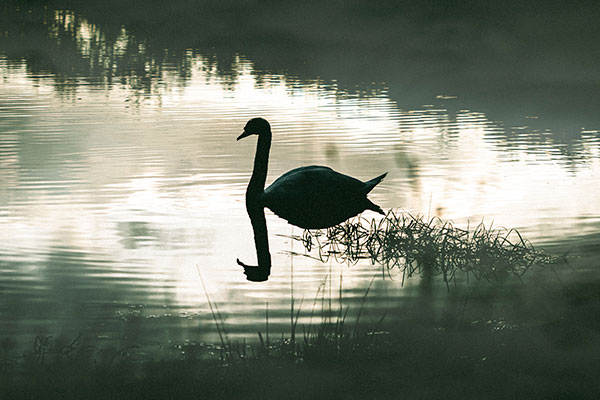While coronavirus continues to sweep across the world, anxiety is understandably increasing.
But before the virus took hold, it was climate and eco anxiety that were troubling many. And rightly so.
The last few months have been jam packed with heart-stopping climate headlines: January was the hottest month on record; February was the wettest recorded in the UK; Antarctic hit 20 degrees for the first time; oil companies enjoy $2trillion in profits while costing the global economy $8billion a day in return.
A week doesn’t go by without yet more climate news to make us worry. And worrying we are. In fact, anxiety around the environment, and more recently, coronavirus, has become a pretty standard way to feel.
Thankfully, while completely natural, feeling anxious needn’t be inevitable – there’s plenty we can do to help ourselves and others feel a whole lot better.
How we respond to any situation decides how we feel about it. Up until recently, my worried thoughts led to a curious combination of behaviours: doing a really good job of ignoring the news and taking actions at random to do the right thing.
Neither response was enough to make me feel better, in fact I found myself worrying most days. So, I decided to change tack. Based on what I know about brain and behavioural science I’ve made a few changes, and (thankfully) it’s working.
Do your research (not loads but some)
Our brains don’t like uncertainty, and some of us struggle with handling unknowns more than others. So, it’s definitely worth knowing your facts on how good or bad things really are. It will make your heart beat faster at times, but it will also give you more certainty and control over your imagination. Find then stick to reputable sources to answer those worries and questions. It sounds counter-intuitive but it works. In the case of coronavirus, a once daily check of the NHS advice and WHO situation report (if you want a global perspective) is entirely sufficient for the most of us.
Take a few meaningful actions
Work on giving yourself the confidence to be able to say: I am doing enough. We are more likely to feel confident if we are responding to a situation in a way the feels appropriate to us.
For coronavirus anxiety, focus on the official advice, avoiding social contact and checking in on vulnerable people. You could also try some of these ideas for kind gestures in the community.
In the face of climate change, where we know much more, taking positive action is the most appropriate response. It helps to know what you are doing is having an impact – for example, WWF’s environmental footprint calculator tells you your current carbon footprint and identifies hotspots to change.
Give yourself a break
There is a limit to what each of us can do and accepting this is half the battle to feeling more at ease. What do you have control and influence over? Focus your thoughts, efforts and energy on that.
If you are making changes in your sphere of influence, then really, it’s time to give yourself a break. For climate action, making positive changes every year will slowly add up to the sustainable lifestyle we all need to adopt this decade.

Talk it out
Giving your worries air time will always help if done right. Most obviously, choose someone who you’d chat to about something that’s bothering you any other time: it’s likely they care about you, you trust them and they’re good listeners. Second, make them aware how it’s affecting you so they know how to respond appropriately. And third, ask questions. Monologuing about your concerns will help but engaging in a conversation will help more – a proper two-way conversation will leave you both feeling better.
Find the positives
If you are already worried, you are more likely to spot, read or listen to a worrying story. Of course, this bias is amplified by the fact the media focuses on the infinitely more compelling negative angle. Be aware of bias, your own and the media’s.
For every negative news story seek out a positive one, it may well not grab top of the page headlines, but in my experience, it is nearly always there.
These actions combined have eased my anxiety. I know what’s going on, I’m confident I’m doing what’s needed and I make sure keep in check who and what I listen to. You have more control over how you feel than you realise. Ask yourself, how do I feel? How am I responding? What helps? What doesn’t? If you’re feeling anxious then take a minute to write your answers down to these questions. Then use this insight to change up your response and, in turn, how you feel.















I have decided to nominate one day a week, Sunday in my case, as a Coronavirus free zone so I can help limit any anxiousness I may be feeling.
So I don’t listen to or watch any news item around the subject on a Sunday. This will be the third Sunday in a row that I have practised this and it does make a difference to me. I catch up on the news on a Monday morning so I don’t miss anything important.
I realise that this won’t be for everyone but I would urge you to find something that does help you.
Stay safe everyone
Sometimes it seems as if a diagnosis has become the way in which we try to cure ourselves of anxiety when, in fact, life is an anxious business and we need a degree of anxiety to survive: staying alert, aware of what could go wrong, anticipating possible danger. The help most young people need isn’t diagnosis or the suggestion that there’s anything wrong with them. I would suggest CBD-rich cannabis strains for anxiety disorders really helps as stated in https://biomdplus.com/cbd-oil-for-anxiety/..